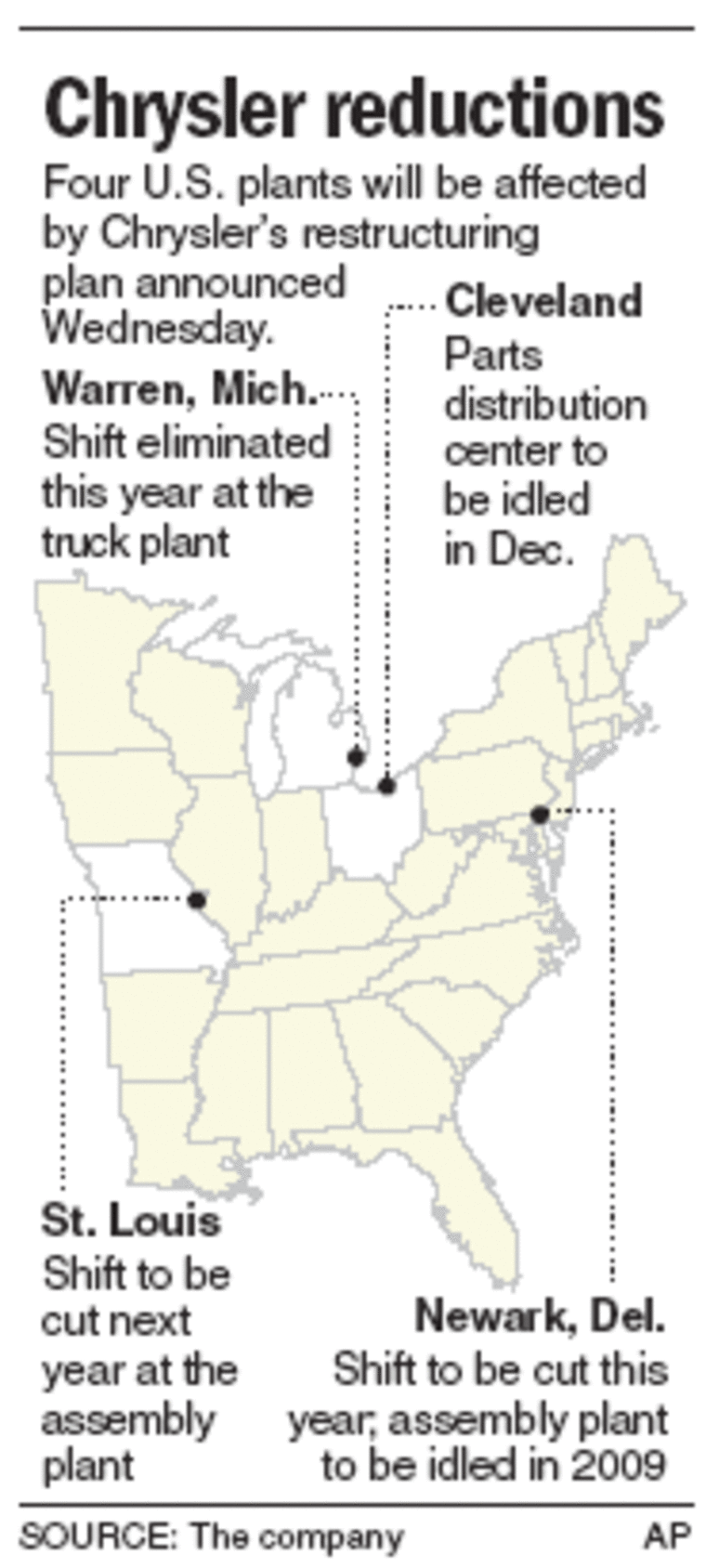DaimlerChrysler employees were hit Wednesday with news of impending layoffs as a result of shift eliminations and plant idlings under the company's restructuring plan, but some remained hopeful that they will find a way to keep working.
The Newark Assembly Plant, which makes the slow-selling Dodge Durango and Chrysler Aspen mid-sized sport utility vehicles, is scheduled to go from two weekly rotating shifts to one shift in the second quarter of this year. DaimlerChrysler plans to idle the plant, which employs about 2,100 workers, in late 2009 at the end of the Durango's production run.
Overall, some 13,000 Chrysler workers will lose their jobs over the next three years. The restructuring plan also calls for reducing shifts at plants in Warren, Mich., and St. Louis. A parts distribution center that employs about 100 workers near Cleveland will be closed. Cutbacks are also possible at plants that make components for those factories.
DaimlerChrysler officials told workers at the Newark plant about the plan Wednesday morning.
"They wanted to emphasize that idling is not closing. That's a matter of debate," said Robert Cooke, 52, an electrician who has worked there for 12 years.
But Cooke and others said they will work hard to prove to management that the plant, which began producing tanks for the military in 1951 and converted to automobile manufacturing in 1957, can turn out a good product if given the chance.
"We shouldn't be looking at Toyota as No. 1," Cooke said. "I don't like being second fiddle to anybody, and we're not even second fiddle. We're more like third or fourth or fifth. ... I think we can do something if we set out to do it."
John McElhaney, 45, a materials handler with 27 years at the Newark plant, said idling equals closing in his mind, but that he has to remain optimistic.
"I'm third-generation here," McElhaney noted. "My grandfather made tanks here."
Members of United Auto Workers Local 1183 noted that DaimlerChrysler plans to introduce 20 new models and more than a dozen redesigns as part of its plan, and they aim to get a piece of the action.
"We intend to have one of the products or some of the products come to Newark Assembly," said Local 1183 President Richard "Mack" McDonaugh Jr. " ... I think after all of this has shaken out, we'll all be just fine."
McDonaugh said Newark workers will have to prove their worth to management, but that he is confident they will "shine."

"We're not the problem," said Chuck Madarani, 47, a repairman who has worked almost 29 years at the Newark plant. "The problem is that management made a bad decision. We paid the price."
Victor Harris, 56, a paint shop worker with 35 years experience, noted that the Newark plant has been idled before, but that its work force has always managed to survive in some fashion.
"This plant could reopen in the future with a new model," he said.
"It's a shame that Chrysler didn't give us something better," Harris added, referring to the slow-selling SUVs. "That's not our fault."
Fred Yeihey, who has worked at the Warren, Mich., truck plant for nine years, believes he'll keep his job. But he worries about those with lower seniority. He said the plant has many workers with five years or fewer on the job, and their fate is tied to whether the company offers buyouts or early retirements.
"Unless a lot of people take buyouts, then people are going to get laid off," he said.
Yeihey knows that the Dodge Rams and Dakotas that his plant makes have fallen out of favor with buyers in a time of high gas prices, which have also been blamed for the Durango's sluggish sales.
"If we had vehicles that get 30 miles per gallon, we wouldn't be worried about our jobs," he said.
In Missouri, about 1,300 people will lose their jobs as the result of a shift reduction next year at the St. Louis South assembly plant in Fenton, which employs about 2,850 workers producing Chrysler and Dodge minivans.
Workers at the St. Louis North plant, which makes Dodge Ram pickups, were spared at the expense of the Michigan plant. But Jim Gideon, 36, who works at the North plant, expressed concern that the company would eventually make even deeper cuts.
"As far as relief goes, there's no relief in this game," said Gideon, a 12-year employee. "It's feast or famine."
